The Prince of Wales processed next to his brother the Duke of Sussex as they honoured the Queen by walking behind her coffin as it was drawn on a gun carriage to the lying in state.
William and Harry were side by side – unlike at the Duke of Edinburgh’s funeral when their cousin Peter Phillips walked between them – in the second row of the procession, with Harry in the middle, William on his right and Mr Phillips on his left.
The brothers put on a united front despite their long-running rift when they greeted mourners at Windsor with their wives at the weekend, two days after the Queen died.
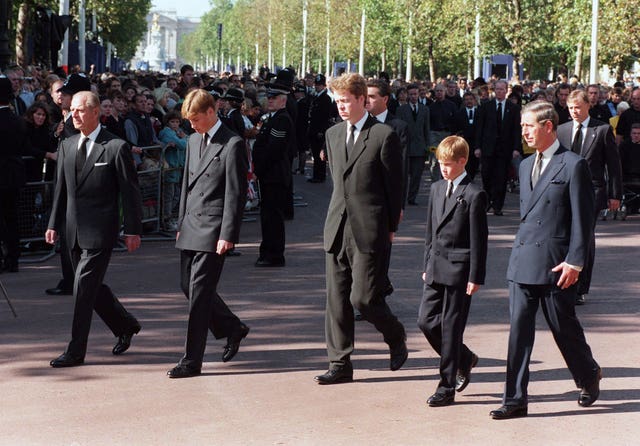
The procession brought back sad memories of when they walked behind the coffin of their mother Diana, Princess of Wales when they were just 15 and 12.
Harry, who spent a decade in the forces including two tours of duty to Afghanistan, was not in military uniform unlike William, because he is no longer a working royal.
In the front row were, from left to right, the Earl of Wessex, the Duke of York, the Princess Royal and the King – all in uniform except for the Queen’s disgraced second son Andrew.
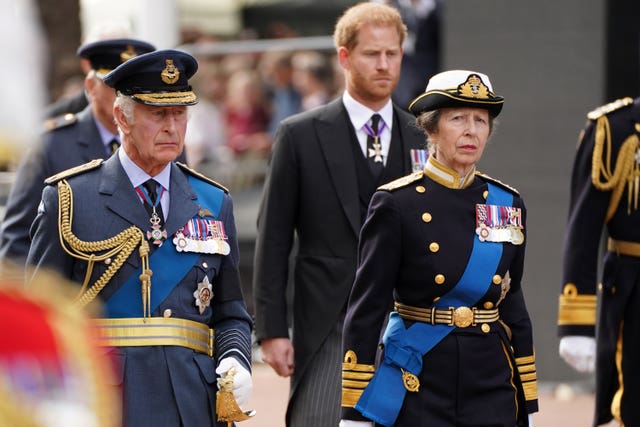
In the third row were Anne’s husband Vice Admiral Sir Tim Laurence, the Queen’s cousin the Duke of Gloucester, and the Earl of Snowdon – the son of the Queen’s sister Princess Margaret.
The Queen Consort, the Princess of Wales, the Duchess of Sussex and the Countess of Wessex were travelling to Westminster Hall by car.
Also forming part of the procession were loyal members of the late Queen’s staff, including two of the Queen’s Pages and the Palace Steward, who walked directly in front of the coffin.
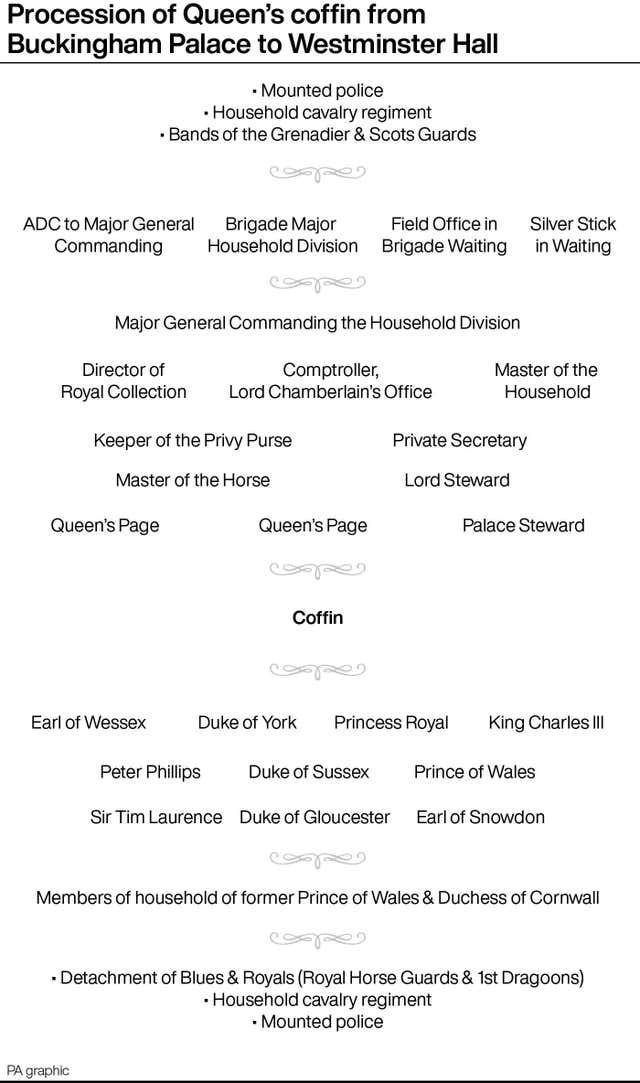
The Pall Bearers were 10 former and serving armed forces equerries to Elizabeth II, who were at her side in uniform throughout her reign, supporting her at engagements and organising her public diary.
Other devoted members of the late Queen’s Household, who aided the monarch as she carried out her duties and in her daily life, processed ahead of the gun carriage, which carried the Queen’s coffin adorned with the Imperial State Crown.
They included her long-standing top aide, private secretary Sir Edward Young, and the Keeper of the Privy Purse Sir Michael Stevens, who is in charge of the monarchy’s finances.
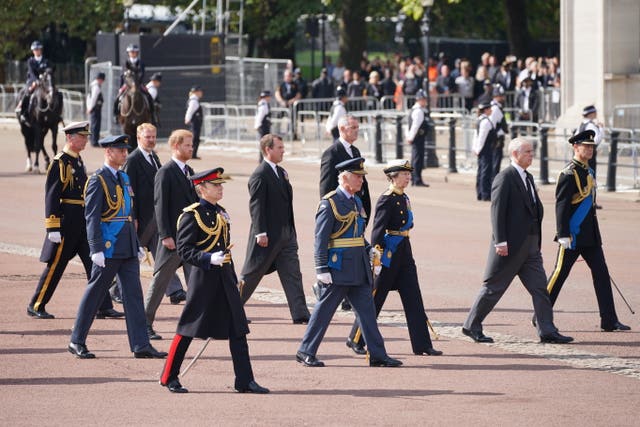
There too were the Comptroller of the Lord Chamberlain’s Office, Lieutenant Colonel Michael Vernon, whose department manages state visits, garden parties, royal weddings and funerals; and the Master of the Household, Vice Admiral Sir Tony Johnstone-Burt, who ensured Buckingham Palace ran like clockwork during the monarch’s official and private entertaining.
The key staff have been heavily involved in the days since the Queen’s death, actioning the London Bridge plans and supporting the new King and grieving royals.
Also processing was the Royal Collection director Tim Knox, who looked after the large collection of royal art and treasures held in trust by the late monarch for her heirs and the nation.
Charles’s key aides also walked as part of the poignant 38-minute journey.
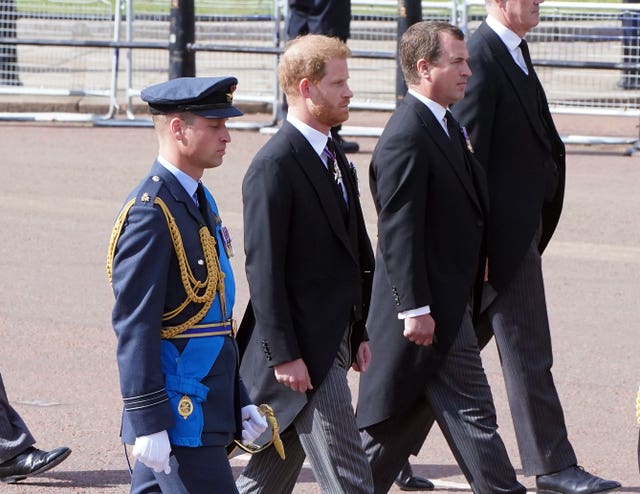
Behind the coffin, following the members of the royal family, was Charles’s Master of the Household, the Earl of Rosslyn, Peter St Clair-Erskine.
He was in charge of the daily running of Charles’s London residence Clarence House, which is being closed down as an office.
The earl was also head of royalty protection for more than 10 years when he was known professionally as Commander Peter Loughborough.
Beside him was Charles’s top aide Sir Clive Alderton, who had sent a letter to Clarence House staff on Monday warning of the threat of redundancy following the King’s accession.
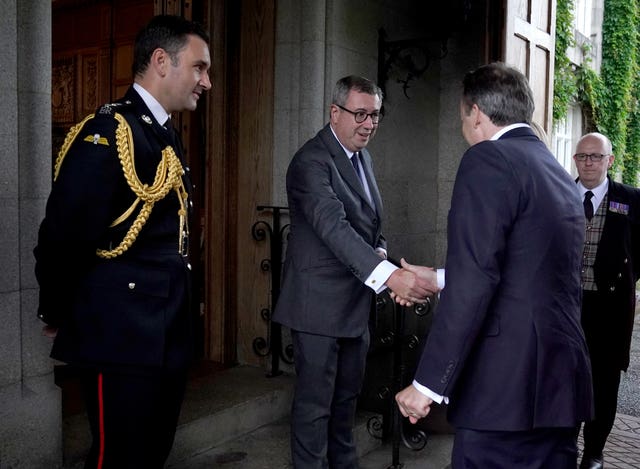
Others taking part included two equerries and the King’s treasurer.
Leading the procession was the Mounted Metropolitan Police, followed by a Dismounted Detachment of The Life Guards, the Household Cavalry Mounted Regiments, and the Bands of the Grenadier and Scots Guards.
The Bearer Party around the coffin is formed of troops from The Queen’s Company 1st Battalion Grenadier Guards.
An Escort Party was made of two officers and 32 rank and file from the 1st Battalion Grenadier Guards, with the Pall Bearers also processing next to the coffin.




Comments: Our rules
We want our comments to be a lively and valuable part of our community - a place where readers can debate and engage with the most important local issues. The ability to comment on our stories is a privilege, not a right, however, and that privilege may be withdrawn if it is abused or misused.
Please report any comments that break our rules.
Read the rules here